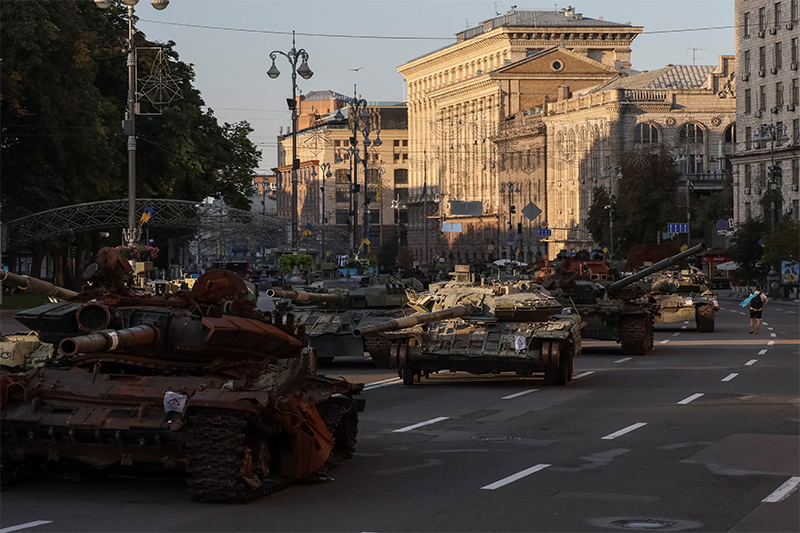Defiant Ukraine celebrates Independence Day six months after invasion


Kyiv- Ukraine was “reborn” when Russia invaded six months ago, President Volodymyr Zelenskiy said on Wednesday, marking 31 years of his country’s independence from the Moscow-controlled Soviet Union with a vow to oust completely the Russian forces.
After days of warnings that Moscow could use Ukraine’s Independence Day anniversary to launch more missile attacks on major cities, Kyiv was exceptionally quiet and Kharkiv’s second-largest city was under curfew after months of bombardment.
The anniversary fell exactly six months after Russia sent tens of thousands of troops to Ukraine.
In a moving speech to his compatriots, Zelenskiy said the attack had revived the spirit of the nation.
“A new nation appeared in the world on February 24 at 4 a.m. He was not born, but reborn. A nation that didn’t cry, scream or get scared. The one who didn’t run away. Didn’t give up. And I haven’t forgotten,” he said.
The 44-year-old leader, speaking in front of Kyiv’s central independence monument in his combat uniform, vowed to take back the occupied areas of eastern Ukraine as well as the Crimean peninsula, which was annexed by Russia in 2014.
“What does the end of the war mean to us? We used to say: peace. Now we say: victory,” he said, days after his government disposed of the carcasses of burnt-out Russian tanks and armored vehicles in central Kyiv in a show of defiance.
Russia’s war effort in Ukraine has made little progress in recent months, after its troops were pushed back from Kyiv in the first weeks of the war.
Russian Defense Minister Sergei Shoigu told a meeting of defense ministers in Uzbekistan that Russia had deliberately slowed down what it calls its “special military operation” in Ukraine to avoid civilian casualties.
Warnings
On Tuesday evening, Zelenskiy warned of the possibility of “disgusting Russian provocations”.
“We are fighting against the most terrible threat to our state and also at a time when we have reached the highest level of national unity,” Zelenskiy said.
The Ukrainian military has urged people to take air raid warnings seriously.
“The Russian occupiers continue to carry out air and missile attacks against civilian objects on the territory of Ukraine. Do not ignore air raid signals,” the General Staff said in a statement on Wednesday.
Zelenskiy told representatives of some 60 countries and international organizations attending a virtual summit on Crimea on Tuesday that Ukraine would drive Russian forces out of the peninsula by any means necessary, without consulting other countries first. .
The war has killed thousands of civilians, forced more than a third of Ukraine’s 41 million people from their homes, left cities in ruins and shaken the global economy. It has largely stalled, with no immediate prospect of peace talks.
Besides Crimea, Russian forces have seized areas in the south, including the Black Sea and Sea of Azov coasts, as well as parts of the eastern Donbass region including the provinces of Lugansk and Donetsk.
Nearly 9,000 Ukrainian servicemen have been killed in the war, its army said this week.
Russia has not made its losses public, but US intelligence estimates the death toll at 15,000 in what Moscow describes as an operation necessitated by threats to its security. Kyiv says the invasion is an act of unprovoked imperial aggression.
Officials installed by Moscow in areas under its control were also killed. The latest was the head of the town of Mykhailivka in the Russian-held part of the Zaporizhzhia region, who a Russian-backed administration official said was killed by a car bomb. On August 6, the deputy head of a town in the neighboring Kherson region was shot dead in his home.
Ukraine declared its independence from the Soviet Union in August 1991 after a failed putsch in Moscow. An overwhelming majority of Ukrainians voted for independence in a referendum in December.
“Intensive” maintenance on plants
International Atomic Energy Agency chief Rafael Grossi said the UN nuclear watchdog hoped to gain access to the Russian-occupied Zaporizhzhia nuclear power plant in southern Ukraine in a few days if the negotiations were successful.
Both sides accused the other of firing missiles and artillery dangerously close to the plant, Europe’s largest, raising fears of a nuclear disaster.
Pro-Moscow forces took control of the plant shortly after the invasion began, but Ukrainian technicians still operate it. The United Nations has called for the demilitarization of the area.
Pope Francis called for “concrete measures” to end the conflict and avoid a nuclear disaster at the nuclear power plant.
Ukraine’s allies offered more military support on Wednesday.
Norway said it and Britain would jointly provide micro-drones to help with reconnaissance and target identification.
The United States, which has sent $10.6 billion in security aid to Ukraine, will announce a new package of about $3 billion as early as Wednesday, a US official said.
Advanced US missile systems appear to have helped Ukraine strike deep behind the front lines in recent months, destroying munitions dumps and command posts.
In the latest mysterious fire at a Russian military installation, Russian officials said munitions stored in southern Russia near the border with Ukraine burned spontaneously on Tuesday.
Vyacheslav Gladkov, the governor of the Belgorod region, blamed hot weather for the blaze, ridiculing Ukraine’s Defense Ministry on Twitter.
“The top five causes of sudden explosions in Russia are: winter, spring, summer, autumn and smoking,” he said.
—Reporting by Reuters offices; written by Stephen Coates and Philippa Fletcher; Editing by Robert Birsel and Gareth Jones